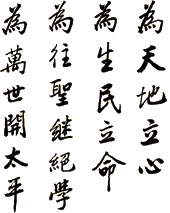

The teachings of the sages that have been imparted by the Chinese throughout ages, have their origins in the love between parent and child. The Chinese share a spirit of camaraderie and cherish harmony and peace.
The ancient classics show that the Chinese have the global interests at heart and are rarely limited to a national and ethnic self-interest. Guidelines for Being a Good Person (Di Zi Gui) states “Love all beings equally” and does not limit this to any particular ethnicity or nationality.
About one thousand years ago, a philosopher of the Northern Song dynasty, Mr. Zhang Zai (also well known as Mr. Heng Qu ), spoke these famous words: “Aspire to benefit the world, serve all living beings, perpetuate the wisdom of generations past, realize world peace for generations to come.” This quote reflects the Chinese having universal interests at heart.
A cultural inheritance from our Chinese forefathers, Chinese characters and Classical Chinese are treasures for all humanity.
Our forefathers invented the Chinese characters and Classical Chinese to preserve the wisdom and experiences of the ancient sages for future generations. The spoken and written languages were separated such that while the vernacular language evolved, the written word remained unchanged. The traditional culture of humanity is therefore able to transcend time and space, and be imparted from one generation to the next. Learning the Chinese characters and Classical Chinese is not difficult at all. Mastering this "key" provides access to reading the Complete Library of the Four Branches of Literature.
With the convenience of communication and travel of today, the world has become one global village. How can the global village maintain peace and harmony? Dr. Arnold Toynbee said that we must rely on the teachings of Confucius, Mencius, and Mahayana Buddhism. In his great wisdom, Dr. Toynbee considered Classical Chinese to be so invaluable that it should be popularised worldwide and become the world's common language.
